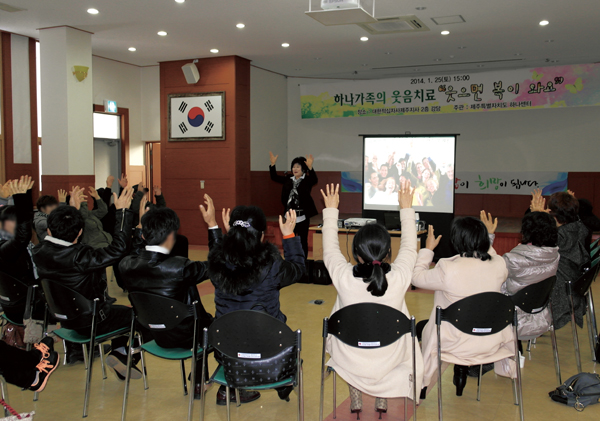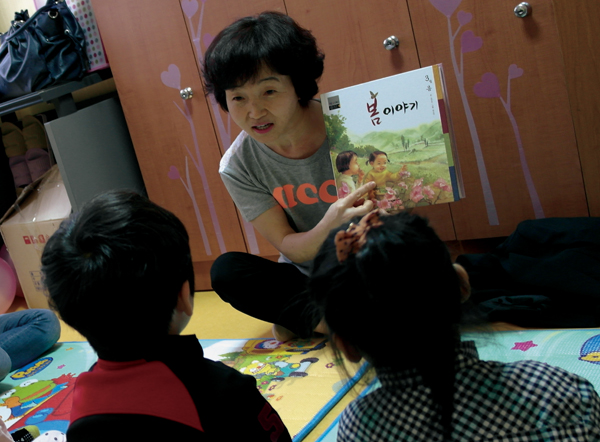| |
 |
|
| ▲ New Settlers, or Saeteomin, at a laughter therapy class at the Jeju Hana Center. Photo courtesy Jeju Hana Center |
“You and I, we're neither North nor South Korean! Do you understand? We belong nowhere!” Hwang Young-min cries in “My Dear Leader,” Jang Jin-sung’s firsthand account of flight from North Korea by two ex-members of the Pyongyang elite.
The book highlights the hinterland of identity that North Koreans inhabit, in a liminal place being Koreanness and foreignness. Searching for somewhere to “belong,” some settle on Jeju, the erstwhile land of exile. While a trickle of North Koreans in the South — officially “Saeteomin,” or New Settlers (not refugees in international law due to their South Korean citizenship) — settle on the island of peace, the search for belonging continues.
Immediately upon reaching the South they undergo up to three months interrogation by state security. They are then relocated to one of three Hanawon, compulsory re-education facilities whose very name, "House of Unity," emphasizes the indivisibility of the Korean nation, seeking to reconstruct Benedict Anderson’s “imagined community.”
The 12-week residency prepares Saeteomin for citizenship in a modern pluralistic state through, says the Ministry of Unification, “Psychological well-being, better understanding of South Korean society, and basic vocational training.” Upon graduation, the second phase of resettlement begins, in the community. After settling where they please — most choose Seoul — they must report to one of 28 community-based Hana Centers nationwide.
Constructing a community on Jeju
Providing educational, health and vocational support, Jeju’s Hana Center opened in 2010 and shares a building with Jeju's Red Cross. Center manager Im Soonim says it is difficult to prepare Saeteomin for the transition from a totalitarian communist state to a cutthroat capitalist society.
“I think they need more time to get to know society, and maybe just experiencing society on their own would be the greatest help to them,” she said, adding that full utilization of the Hana Center would benefit Saeteomin, but illness and mental health problems mean they are unable to fully take advantage of the training and services on offer.
There are over 100 households in the province, with around 179 individuals (of 26,717 Saeteomin nationwide) who often come because of family connections or the slower lifestyle. The low numbers help the center provide more tailored support, and there are some employment opportunities in tourism, particularly for Chinese speakers.
“On the mainland ... it is very difficult to give support equally to all Saeteomin [but] they feel closer to the center on Jeju,” adding, “All the wonders of nature are within reach and the atmosphere is very supportive to people’s mental well being.”
A traumatic past
Hana Centers support Saeteomin for their first five years in the South, with two Red Cross “settlement supporters” assigned to each for their first six months. This is in addition to the first two months in the community when they receive intensive classes on culture, music, healthcare, first aid, laughter therapy, even English, among much else.
Around 70 percent of those fleeing North Korea are women, many trafficked into the sex trade. Although statistics for Jeju Saeteomin are unavailable, a 2012 study by Yonsei University School of Social Welfare found that over a quarter of had been sexually abused during flight and, furthermore, 30 percent had been encouraged to prostitute themselves since arrival.
The study also showed that 57.6 percent suffered post-traumatic stress disorder, 45.7 percent had been suicidal or attempted suicide in the past year, and 70 percent suffered from chronic health ailments. On socio-economic measures, a 2011 study by the North Korean Refugees Foundation showed 30 percent earned less than 1 million won a month with 12.1 percent unemployed, triple the national rate, contributing to high rates of dissatisfaction with the resettlement process.
Hana Centers thus have their work cut out as the traumatic shadow of life within and without the North looms large. Jang, in Dear Leader, sums up their internal struggles:
“At night, our fears take hold of us, as we are returned to the oppressive surveillance, or find ourselves arrested by secret police and hauled away to a prison camp, “ adding that true release is only possible when their dreams are “set in the safety of our new country.”
| |
 |
|
| ▲ A Hana Center volunteer reads a book to a child. Photo courtesy Jeju Hana Center |
Making the transition
As well as getting to grips with social mores and norms far removed from the North, language is a surprisingly difficult aspect of adaptation. The high number of loan words and neologisms in modern Korean make it a very different language from that spoken in the North, which is dominated by a manufactured “pure Korean” and Pyongyang standard.
“It is the same as when people from the mainland cannot understand the Jeju dialect easily at first ... I think if someone wants to live in a certain place, they should try to adapt to the surrounding society,” says Im, adding that it is a two-way street, with mutual understanding needed which also allows for Saeteomin to have pride in their heritage.
The danger of cross-cultural misunderstanding is very real, and Im says some parents hide their children’s origins from schools for fear of bullying. Children are already the hardest to reach, with many slipping through the net after being born in China and spending up to a decade there (where they were stateless). Forlornly, Im admits they are the “blind spot of welfare support,” suggesting the need for more pro-active support and education programs.
“There are some children who ask for help, but there are more children who just stay at home and don’t report their feelings and problems,” she said, continuing, “So, [179] is not the exact number of people who need support — there are many more when we include the children of Saeteomin,” she said.
Although there remains much mutual misunderstanding between Saeteomin and wider society, Im says it is the Hana Center’s “homework” to bring the sides closer together, which starts with interaction.
“When people actually see Saeteomin and spend time together, they tend to change their minds more easily ... Even volunteers have to spend some quality time with Saeteomin to get to know these people, share their feelings from the heart and completely receive them,” Im said.
Poignantly, Im says many Saeteomin are familiar with Jeju’s history of exile, and like those exiles of yesteryear, many struggle to reconcile conflicting identities in a land made foreign. As they continue their journey and await the time for their new land to penetrate their dreams, Im is working earnestly to ensure they do not remain trapped in a recurring nightmare.
For more information about North Korean resettlement visit eng.unikorea.go.kr |





















